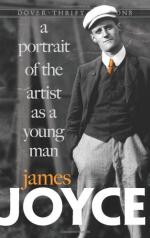He smiled as he thought of the god’s image for it made him think of a bottle-nosed judge in a wig, putting commas into a document which he held at arm’s length, and he knew that he would not have remembered the god’s name but that it was like an Irish oath. It was folly. But was it for this folly that he was about to leave for ever the house of prayer and prudence into which he had been born and the order of life out of which he had come?
They came back with shrill cries over the jutting shoulder of the house, flying darkly against the fading air. What birds were they? He thought that they must be swallows who had come back from the south. Then he was to go away for they were birds ever going and coming, building ever an unlasting home under the eaves of men’s houses and ever leaving the homes they had built to wander.
Bend down your faces, Oona
and Aleel.
I gaze upon them as the swallow
gazes
Upon the nest under the eave
before
He wander the loud waters.
A soft liquid joy like the noise of many waters flowed over his memory and he felt in his heart the soft peace of silent spaces of fading tenuous sky above the waters, of oceanic silence, of swallows flying through the sea-dusk over the flowing waters.
A soft liquid joy flowed through the words where the soft long vowels hurtled noiselessly and fell away, lapping and flowing back and ever shaking the white bells of their waves in mute chime and mute peal, and soft low swooning cry; and he felt that the augury he had sought in the wheeling darting birds and in the pale space of sky above him had come forth from his heart like a bird from a turret, quietly and swiftly.
Symbol of departure or of loneliness? The verses crooned in the ear of his memory composed slowly before his remembering eyes the scene of the hall on the night of the opening of the national theatre. He was alone at the side of the balcony, looking out of jaded eyes at the culture of Dublin in the stalls and at the tawdry scene-cloths and human dolls framed by the garish lamps of the stage. A burly policeman sweated behind him and seemed at every moment about to act. The catcalls and hisses and mocking cries ran in rude gusts round the hall from his scattered fellow students.
—A libel on Ireland!
—Made in Germany.
—Blasphemy!
—We never sold our faith!
—No Irish woman ever did it!
—We want no amateur atheists.
—We want no budding buddhists.
A sudden swift hiss fell from the windows above him and he knew that the electric lamps had been switched on in the reader’s room. He turned into the pillared hall, now calmly lit, went up the staircase and passed in through the clicking turnstile.
Cranly was sitting over near the dictionaries. A thick book, opened at the frontispiece, lay before him on the wooden rest. He leaned back in his chair, inclining his ear like that of a confessor to the face of the medical student who was reading to him a problem from the chess page of a journal. Stephen sat down at his right and the priest at the other side of the table closed his copy of the tablet with an angry snap and stood up.




